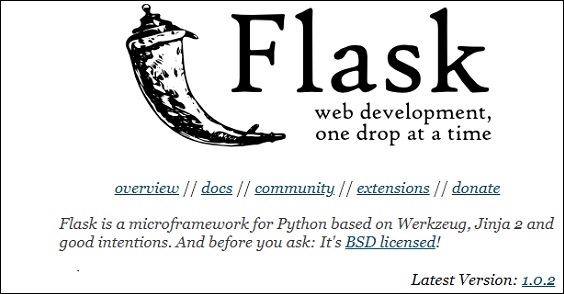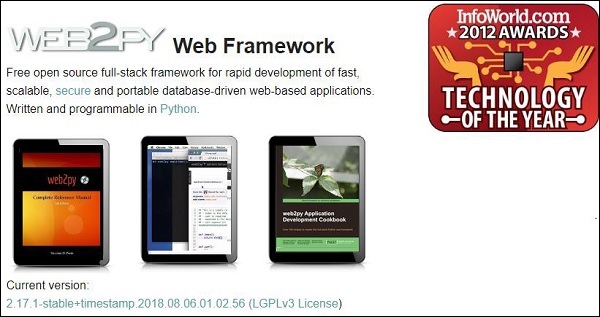
Python Frameworks
Python is one of the most acceptable languages among web and application developers because of its strong emphasis on efficiency and readability. There are numerous outstanding Python web frameworks, each with their own specialities and features.
Django
Here, we will outline some necessary details and features of Django framework.
Category − Django belongs to the full-stack Python framework.
Release − Latest release 2.1 version, commonly used release 1.8, 1.6 version.
About − Built by experienced developers, Django is a high level Python web framework which allows rapid, clean and pragmatic design development. Django handles much of the complexities of web development, so you can focus on writing your app without a need to reinvent the wheel. Its free and open source.
To map objects to database table, Django uses ORM and the same is used to transfer from one database to other.
It works with mostly all important databases like Oracle, MySQL, PostgreSQL, SQLite, etc.
There are numerous websites in the industry which uses Django as their primary framework for backend development.
Features of Django
Some of the exemplary features of this Python web framework are −
- URL routing
- Authentication
- Database schema migrations
- ORM (Object-relational mapper)
- Template engine
The Official Website for Django framework is −https://www.djangoproject.com/

Flask
Category − Flask belongs to Non Full-stack frameworks.
Release − 1.0.2 released on 2018-05-02
About − It is classified as a micro-framework as we dont require any particular libraries or tools. It has no form validation or database abstraction layer or any other components where pre-existing third party libraries provide common functions. However, flask support multiple extensions which extended the application features as if they were implemented in Flask itself. Extensions exist for object-relational mappers, form validation, upload handling, various open authentication technologies and several common frameworks related tools.
Features of Flask
- Integrated support for unit testing
- Restful request dispatching
- Contains development server and debugger
- Uses Jinja2 templating
- Support for secure cookies
- Unicode-based
- 100% WSGI 1.0 compliant
- Extensive documentation
- Google App Engine compatibility
- Extensions available to enhance features desired

Web2py
Category − Web2py belongs to Full-stack framework family.
Release − 2.17.1, released on 2018-08-06
About − Python 2.6, 2.7 to Python 3.x version. With no further dependencies, its a complete package in itself. Development, database administration, debugging, deployment, testing, and maintenance of applications all can be done through web interface, but generally not required. It is a scalable open source framework that comes with its own web-based IDE alongside a code editor, one-click deployment and debugger.
Features of Web2py
This framework comes with many developing tools and built-in features that eliminate the hassle of complexity to the developers.
With no installation and configuration, it is easy to run.
Supports almost all major operating system, like Windows, Unix/Linux, Mac, Google App Engine and almost all web hosting platform through Python 2.7/3.5/3.6/ version.
Easy to communicate with MySQL, MSSQL, IBM DB2, Informix, Ingres, MongoDB, SQLite, PostgreSQL, Sybase, Oracle and Google App Engine.
It prevents the most common types of vulnerabilities including Cross Site Scripting, Injection Flaws, and Malicious File Execution.
Supports error tracking and internationalization.
Multiple protocols readability.
Employs successful software engineering practices that makes code easy to read and maintain.
Ensure user-oriented advancements through backward compatibility.

Pyramid
Category − Pyramid is a non-Full Stack Frameworks
Release − 1.9.2, released on 2018-04-23
About − Pyramid is a small, fast, down-to-earth Python web framework. It is developed as part of the Pylons Project. It is licensed under a BSD-like license. It makes real-world web application development and deployment more fun, more predictable and more productive.
Features of Pyramid
Python Pyramid is an open sourced framework with the following features −
Simplicity − Anyone can start to work with it without any prior knowledge about it.
Minimalism − Quite out of the box, Pyramid comes with only some important tools, which are needed for almost every web application, may it be security or serving static assets like JavaScript and CSS or attaching URLs to code.
Documentation − Includes exclusive and up to date documentation.
Speed − Very fast and accurate.
Reliability − It is developed, keeping in mind that it is conservative and tested exhaustively. If not tested properly, it will be considered as broke.
Openness − Its sold with a permissive and open license.

Dash
Category − The Dash framework belongs to other Python web frameworks.
Release − 0.24.1, core dash backend.
About − Dash as an open source library for creating interactive web-based visualizations. The plotly team created Dash an open source framework that leverages Flask, React.js and plotly.js to build custom data visualization apps. Key highlight of this library is that you can build highly interactive web application only through Python code. Data scientists love dash framework, specially all those who are less familiar with web development.
With Dash, developers get access to all the configurable properties and underlying Flask instance. The applications developed using Dash framework can be deployed to servers and are eventually rendered in the web browser.
Dash applications are inherently cross-platform (Linux/Win/Mac) and mobile friendly and the capabilities of applications can be extended by the rich set of Flask Plugins.

Features of Dash
- Provides access to configurable properties and Flask instance
- Through Flash plugins, we can extend the capabilities of the Dash application
- Mobile-ready